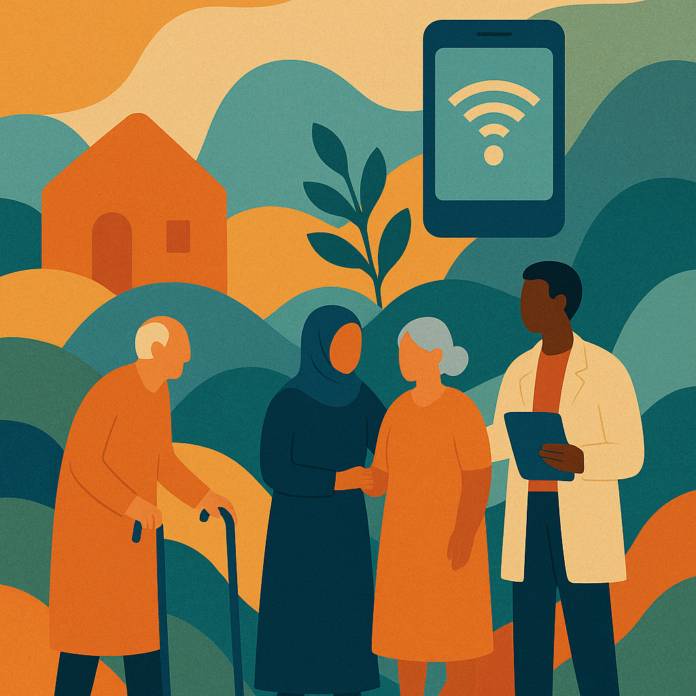On April 16, 2025, I had the privilege of participating in the Arab Forum for Sustainable Development (AFSD-2025), specifically the thematic session on Sustainable Development Goal 3 (SDG 3): “Delivering Healthcare in Emergencies.” This critical conversation brought together experts and policymakers from across the region to reflect on how health systems are responding—or failing to respond—in times of crisis.
As a panellist representing the MENARAH Network, I focused on the often-overlooked intersection of ageing, caregiving, and health equity in the Arab world. My contribution centred around a theme that is both timely and frequently absent from policy discourse: the social determinants of health, especially for older adults and their informal carers.
Shifting the Focus: Ageing and Care as Determinants of Health
In the Arab region, ageing is no longer a distant challenge. Our older population is projected to triple by 2050, reaching over 70 million. However, healthy ageing remains elusive. This is not solely a health systems issue—it is deeply rooted in social and economic conditions.
Older people and their caregivers, particularly women, face layered vulnerabilities in emergencies: displacement, disability, and poverty all magnify health and social care needs. Yet, they remain largely invisible in national health strategies and emergency plans.
During the COVID-19 pandemic, for example, mental health services for older adults were suspended in over half the countries in the region. In Jordan, 79% of COVID-19 deaths occurred among those aged 60 and above. These are not just statistics—they represent lives diminished or lost due to systemic neglect.
Informal Carers: The Gendered Face of Resilience
Another theme I emphasised was the indispensable role of informal carers, the majority of whom are women. These carers are the unsung heroes of crisis response, often providing 80–90% of long-term care under the most challenging conditions. Yet, they do so without training, income support, or inclusion in policy planning.
This lack of recognition not only jeopardises the wellbeing of caregivers but also compromises the quality of care received by older persons—especially during emergencies when care needs multiply and support systems collapse.
MENARAH’s Contributions to Understanding Ageing and Care
The MENARAH Network has been at the forefront of research and advocacy on these issues. Our initiative, The Meaning of Healthy Ageing in the MENA Region, explores culturally sensitive definitions of healthy ageing, engaging with older people, their families, and informal carers to inform effective policies and interventions.
In our research, Understanding Ageing Perceptions in the MENA Region: The Role of the MENARAH Network, we delve into how cultural norms, perceptions, and the practical application of care for older individuals often need improvement, resulting in limited opportunities for social engagement and increased vulnerability.
Furthermore, our work with the WHO Kobe on Addressing Unmet Health and Social Care Needs of Older People in the Eastern Mediterranean highlights the compounded challenges faced by older adults in conflict-affected nations, emphasising the need for comprehensive care frameworks.
Policy Levers: What Needs to Change
From Egypt’s 2024 Elderly Care Law, which criminalises elder abuse and promotes home-based care, to Tunisia’s draft Code on Older Persons and Saudi Arabia’s volunteer outreach programmes, there are promising initiatives across the region. But these remain fragmented and underfunded.
To advance SDG 3 in meaningful ways, especially in emergency contexts, we need to:
- Systematically include older persons and carers in emergency preparedness plans.
- Invest in community-based long-term care (LTC) and recognise caregiving as essential labour.
- Develop age- and disability-sensitive training for emergency responders.
- Promote digital inclusion, adult literacy, and lifelong learning to support healthy ageing.
Ageing as a Development Opportunity
Rather than viewing ageing as a burden, we should recognise it as a policy lever for inclusive growth. Investing in LTC systems can generate employment—particularly for women and youth—while supporting family resilience and gender equity. The care economy is a key driver of sustainable development and deserves prioritised investment.
Our report, Setting the Way Forward for Older People in the Arab Region, provides a novel analysis of the fiscal implications of ageing and offers estimates of LTC cost as a percentage of GDP in select countries, underscoring the economic rationale for investing in ageing populations.
Looking Ahead with MENARAH
At MENARAH, we are committed to evidence-based research, advocacy, and policy engagement around healthy ageing in the MENA region. Our presence at AFSD-2025 reaffirmed that ageing and informal care are not peripheral issues—they are central to achieving health equity and social justice.
As crises become more frequent and complex, we must design health systems that are inclusive, resilient, and grounded in dignity for all—especially for those who have long been on the margins of care.
Founder and Director
Shereen Husseinis a Health and Social Care Policy professor at the London School of Hygiene and Tropical Medicine (LSHTM), United Kingdom.
Shereen Founded the MENARAH Network in 2019, through an initial grant from the Global Challenge Research Fund, UKRI. She is a medical demographer with expertise in ageing, family dynamics, migration and long-term care systems. Shereen regularly collaborates with the United Nations, the World Health Organisation and the World Bank in policy and research focused on ageing in the Middle East and North Africa Region.
Shereen received her undergraduate degree in statistics and a postgraduate degree in computer science at Cairo University. She completed an MSc in medical demography at the London School of Hygiene and a PhD in quantitative demography and population studies at the London School of Economics and Political Science, United Kingdom.






